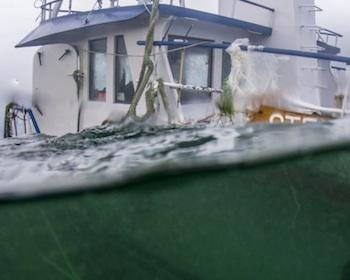Heiltsuk Nation is going to court to seek damages and challenge Canada’s oil spill response, one year after the Nathan E. Stewart ran aground, sank and spilled oil into Gale Pass in Heiltsuk territory.
October 13 will mark the first-year anniversary of the oil spill in Bella Bella. A press statement says the community’s recovery efforts have been undermined by both the federal and provincial governments. Heiltsuk says “Kirby Corporation’s refusal to take responsibility for the spill and to cooperate in its aftermath” leaves the nation no option but to turn to the courts.
“The oil spill continues to be a catastrophic injury to our food sources, culture, and economy,” said Heiltsuk Tribal Council Chief Councillor Marilyn Slett. “Thanks to Kirby Corporation and the governments of British Columbia and Canada, our community’s road to recovery keeps getting longer and longer.”
The nation accuses the government and Kirby of keeping secret information about what occurred on Oct. 13, 2016 despite numerous requests for information to Kirby and government agencies, including Transport Canada, the Transportation Safety Board, and the Canadian Coast Guard.
“Recently, we learned the B.C. Ministry of Environment and Kirby have been secretly negotiating an agreement on the post-spill environmental impact assessment since early this year,” said Slett.
“Since this nightmare began, the polluter and provincial and federal governments have ignored our questions and environmental concerns, our collaboration attempts, and our rights as Indigenous people.”
The nation is preparing to take legal action, aiming to recover damages suffered by members and to examine the actual state of Canada’s “world class” oil spill response system, reads the statement.
The case will seek compensation for loss of commercial harvesting of marine resources and infringement of Aboriginal rights relating to food, social and ceremonial importance of marine resources, factors that the current oil spill liability framework does not account for.
“We’re learning the hard way that Indigenous people and coastal communities can’t count on polluters, Western Canada Marine Response Corporation, or the governments of B.C. and Canada in a crisis situation," said Kelly Brown, director of the Heiltsuk Integrated Resource Management Department.
"For our sake, and the sake of our neighbours, we are consulting with a range of experts to assess damages, recovery times, and, ultimately, determine how we can prevent a similar disaster in the future.”
Analyses of the oil spill response have revealed massive safety and planning oversights, says Heiltsuk, including a lack of spill response materials; ineffective booms and delays in employing them; a lack of safety instructions and gear for Heiltsuk first responders exposed to diesel and dangerous marine conditions; and confusion over who was in charge in the early hours of the oil spill.
“Government representatives travel the province, country, and the world preaching reconciliation and nation-to-nation relationships with first people. Meanwhile, back home, they are avoiding our calls and emails, excluding us from meetings, and ignoring our rights,” said Hereditary Chief Harvey Humchitt. “If the courts have to explain that this is not what nation-to-nation relationships and reconciliation look like, so be it.”
Related articles:
Shoreline cleanup crews have been deployed to try to recover diesel contaminating tidal beaches and rocky shoreline areas from the sunken Nathan E. Stewart tug in Heiltsuk waters. The tug ran aground and sank on Oct. 13 in Seaforth Channel, about 20 kilometres west of Bella Bella.
An adjudication committee made up of knowledge keepers and title holders is being struck by the Heiltsuk Tribal Council to determine if a marine disaster that occurred in their coastal waters last year violated any Heiltsuk traditional law.

